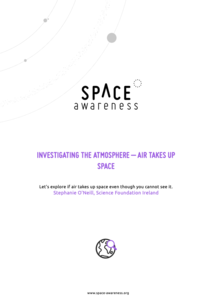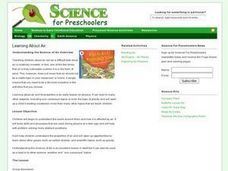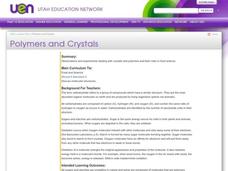Curated OER
The Properties of Air
First graders draw conclusions about the properties of air. In this properties of air lesson, the teacher demonstrates several properties of air and guides students through discovering that air is colorless, tasteless, odorless, exerts...
Physics Classroom
Name That Harmonic: Closed-End air Columns
Physics is like music—practice makes perfect! Challenge your class using an interactive that builds harmonic skills. The engaging lesson from a playlist exploring sounds and waves revolves around wave behavior in closed-end air columns....
Physics Classroom
Name That Harmonic: Open-End air Columns
Ever wonder what really goes on inside a clarinet? Show your young scientists the physics of open-end air columns through an easy-to-use interactive. Learners examine the features of standing waves and calculate frequency and length in a...
Curated OER
Air Is there
Learners experiment to observe air and its mass. In this air lesson, students use the scientific method to complete experiments that demonstrate the properties of air. Learners view a video as follow-up.
Space Awareness
Investigating the Atmosphere - Air Takes Up Space
How do you know there is air? Can you see it, smell it, feel it? To begin the investigation, learners watch a video and discuss what they know about air and the atmosphere. Then, they participate in five different hands-on, inquiry-based...
Curated OER
Air Pressure
Learners participate in a series of demonstrations about Bernoulli's principle. They explain how air pressure varies with air speed. They write a detailed lab report about the activity. This is a great way to explore this concept.
It's About Time
Elements and Their Properties
How did ancient scientists classify elements? Answer this question and others as young chemists create a device to test the properties of various elements. They classify elements as metals or nonmetals, learn to differentiate between...
Curated OER
Student Reading - The Unique Properties of Water
Without water there would be no life on this planet. Biology learners find out why by reading this handout. Create a worksheet of questions to answer after the reading. Follow it up with quick demonstrations or laboratory activities that...
Curated OER
Air Pressure
Students examine air pressure. In this air pressure instructional activity, students perform a series of experiments to evaluate the effects of air pressure.
Curated OER
Learning about air
Learners read a book and have a class discussion about the air around them. In this air lesson plan, students learn about properties of air, and discuss other gases they have observed.
Curated OER
Properties of Air
Fourth graders participate in a demonstration lesson using bubbles in which they determine that air fills the bubbles. Next, they work in small groups as they they experiment with the properties of air at separate work stations. After...
Colorado State University
Why Can Warm Air "Hold" More Moisture than Cold Air?—Vapor Pressure Exercise
Does it feel a little humid in here? Learners assume the role of water vapor in the atmosphere as they explore the differences between warm and cold air. They roll dice to determine their level of energy, which determines if they stay...
PBS
Blow the Roof Off!
Blow the minds of young scientists with this collection of inquiry-based investigations. Based on a series of eight videos, these "hands-on, minds-on" science lessons engage young learners in exploring a wide range of topics from making...
Curated OER
Properties of Air Activity
In this properties of air worksheet, students experiment with a jar, a plastic bag and rubber bands to simulate that air takes up space and exerts pressure. They make observations and answer questions about their experiment.
Curated OER
What's Air Got to Do with It?
Young scholars use M&M's to create a pie graph that expresses their understanding of the composition of air. They watch and conduct several simple experiments to develop an understanding of the properties of air (it has mass, it...
Cornell University
Buoyancy
Swimmers know to float by turning their bodies horizontally rather than vertically, but why does that make a difference? In an interesting lesson, scholars explore buoyancy and the properties of air and water. They test cups to see which...
Curated OER
Properties of Air
Students conduct investigations to demonstrate and learn that air takes up space, and puts pressure, or pushes, on everything around it. They conduct experiments to learn about feeling air pressure and measuring air pressure. Prior to...
Curated OER
Differences Between Ground and Air Temperatures
Students examine the differences between air temperature and ground temperature. In this investigative instructional activity students find NASA data on the Internet and use it to create a graph.
Curated OER
Properties of Fresh and Sea Water
Students work with three stations to demonstrate the properties of water. They explore water's boiling point, freezing point, and its ability to store heat.
Santa Monica College
The Properties of Oxygen Gas
Scholars generate and collect pure oxygen through a decomposition reaction of hydrogen peroxide in the fourth lesson of an 11-part series. Then, they complete six investigations into the properties of oxygen.
Curated OER
Polymers and Crystals: Their Role in Food Science
Blend chemistry with cooking in this exploration of polymers, carbohydrates, and food science. Experimenting with gelatin produces concrete examples of the bonding and ploymerization discussed in the lesson. Copious, comprehensive...
Center for Learning in Action
Gases
Explore the properties of gases through one activity and two investigations in which super scientists observe the changes gas makes when encountering different conditions.
Space Awareness
Fizzy Balloons - C02 in School
Carbon dioxide is a very important gas; it is present in the air, used in cooking, and supports plant and animal life. Scholars investigate the properties of carbon dioxide with three different activities. They experience a color change,...
PHET
Gas Properties
We can't see most gases and we can't see things at the molecular level — but that's about to change! A simulation shows pupils the activity of molecules in a gas. The simulation allows scholars to vary the volume, heat, and gravity in a...

























